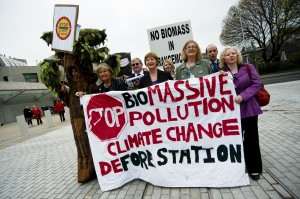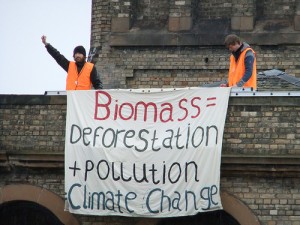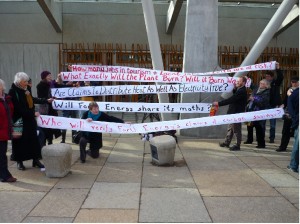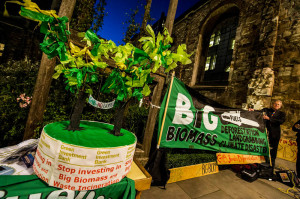Update: In March 2019, Falkirk Council rejected a planning application which would have extended planning consent. This means that there is now no planning consent that would allow a biomass power plant to be built at Grangemouth Port.
On 19th October 2018, a subsidy guarantee (Contract for Difference) awarded to Grangemouth Renewable Energy Ltd was formally withdrawn, due to insufficient progress.
The decision, announced by the Low Carbon Contracts Company (the agency responsible for managing Contracts for Difference) has hopefully brought a happy ending to a long campaign against a large import-reliant biomass power station in the already heavily polluted town of Grangemouth.
The campaign started in 2010 and stretched over six years – excluding two years (2015 and 16) when we and everybody else wrongly assumed it had been won. Throughout that time, Grangemouth Community Council took the lead role in objecting to the planning application. Biofuelwatch worked closely with the Community Council and many other supportive groups, mainly in Scotland but also in the US and Denmark – first to stop the planning consent and then to prevent investment in the plant. Local residents and campaigners stood against Scotland’s largest port operators (Forth Ports) one of the UK’s largest energy companies (SSE), the Scottish Energy Minister – and in the end also a large Danish pension fund.
Although this was one of four biomass power stations proposed but never built by Forth Energy, there were strong indications over several years that the Grangemouth biomass plant was the one which the company was most committed to building.
Below is a timeline (not comprehensive) which gives an insight into how the power station was stopped against all the odds. We can never be 100% certain that any power station has been stopped for all times – but with the subsidy guarantee having been withdrawn, the Danish pension fund having pulled out, and new subsidy rules announced which would prevent anyone else from getting a Contract for Difference – we’re highly optimistic!
Note, however that, despite this important victory, the community of Grangemouth is still facing other destructive polluting developments, above all a massive expansion plan by the oil and gas company INEOS, and a waste incinerator being built by the chemical company Calachem.
2010: Forth Energy submits four big biomass plans in Scotland, campaign starts:
+ Forth Energy, a collaboration of Forth Ports and SSE, submits planning applications for four large import-reliant biomass power stations: in Edinburgh (Leith), Dundee, Grangemouth and Rosyth.
+ Residents and campaigners in Leith set up the No Leith Biomass campaign, while Friends of the Earth Tayside links up with local residents to object. Campaigners in Leith will go on to win in 2012, when that application is withdrawn. The Dundee campaign will celebrate a similar success in 2014.
+ Climate Camp is held in Edinburgh and, as part of a diverse Day of Action, a group of activists occupies Forth Energy’s office and draws Scotland-wide attention to the four controversial biomass plans.
+ Grangemouth Community Council objects, as do the neighbouring Polmont Community Council and 986 local residents. That’s almost 1,000 people out of a population of around 18,000. Biofuelwatch objects to the Energy Consents application lodged with the Scottish Government.
2011: The campaign grows, with diverse protests and objections
+ The volume of local objections persuades Falkirk Council to object to the plans. This means that the proposal has to go to a public inquiry, after which it will be decided by the Scottish Government.
+ Forth Energy has to re-consult and this time, more organisations object, including Biofuelwatch and Friends of the Earth Scotland, which start campaigning publicly against the four biomass plants;
+ No Leith Biomass organises a banner protest against the four plants outside the Scottish Parliament.
+ Activists from a ‘Action AgainstAgrofuels’ blockade Grangemouth Port for eight hours in protest against Forth Ports, who own Forth Energy.
+ Seven environmental NGOs from the USA publish an Open Letter warning against the impacts the plants would have on southern US forests.
2012: The busiest year: Public inquiry and campaign to stop subsidies for big biomass
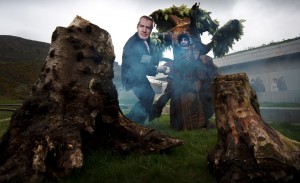
Protester dresses as Calum Wilson, CEO of Forth Energy, outside Scottish Parliament (Apr 2012). Photo courtesy of FOES
+ Biofuelwatch and Friends of the Earth Scotland lead joint campaign to stop renewable energy subsidies in Scotland going to big biomass power plants, with a primary focus on Forth Energy. This includes a public meeting in the Scottish Parliament, a banner protest outside Holyrood, an e-campain to MSPs and much more. Grangemouth Community Council is actively involved in the campaign, as are the local groups in Leith and Dundee.
+ Grangemouth Community Council takes the lead role in opposing the biomass proposal at a Public Inquiry, heading a coalition with Biofuelwatch, two other nearby Community Councils, two local Friends of the Earth groups, and the River Carron Fisheries Management Group. The latter were concerned about the number of fish that would be killed by the power station’s cooling system. In-depth evidence is presented on five different planning grounds, including sustainability, air quality and impact on local wildlife and fisheries.
2013: The year it seemed the campaign had been lost
- Fergus Ewing, the then Scottish Energy Minister, approves Forth Energy’s planning application in Grangemouth. Grangemouth Community Council resigns in protest. None of the local residents involved in the campaign can afford to pay thousands of pounds – and risk having to pay many thousands more – over a Judicial Review.
- The Scottish Government approves new biomass electricity subsidies rules which fall far short of what is needed: Subsidies will not be awarded for new electricity-only biomass plants. However, large biomass plants can qualify as ‘combined heat and power’ if they use or supply a very limited amount of heat and reach a mere 35% total efficiency.
- Biofuelwatch starts campaign to prevent Green Investment Bank from investing in the Grangemouth biomass plant with an e-alert.
2014: The year when it seemed the campaign might have been won
+ Forth Energy announced that it won’t build the Grangemouth or the Rosyth biomass power stations after all(two months after their Rosyth planning application is approved). However, it will seek another company to take over the plans.
+ Biofuelwatch’s campaign against Green Investment Bank funding for biomass plants in Grangemouth or Rosyth continues with protests in London and Edinburgh, and an Open Letter signed by civil society groups and MSPs.
+ March 2014: FE announces it won’t build the power stations but will look for another company to take over the Grangemouth and Rosyth planning consents.
2015/2016: The years we (wrongly) took their eyes off this campaign
+ Biofuelwatch’s wider campaign against Green Investment Bank (GIB) funding for big biomass continues, with protests outside its Annual Meetings in London and Edinburgh. However in 2016, the Green Investment Bank is privatised and sold to Macquarie Group, a notorious investor in fossil fuels as well as big biomass.
+ Unknown to Biofuelwatch or residents in Grangemouth, a start-up company called Silva Renewable Energy decides that it wants to build the biomass plant for which Forth Energy got planning consent.In 2015, it receives its first grant from Scottish Enterprise. Between 2015 and 2018, Scottish Enterprise pays out over £475,000 for Silva to build this power station.
+ Also unknown to Biofuelwatch or residents in Grangemouth, the Scottish Government begins working with the local authority and Silva Renewables in favour of a biomass ‘combined heat and power plant’ in Grangemouth.
2017: Bad news again!
+ September 2017: Silva Renewable Energy’s Grangemouth subsidiary is awarded a Contract for difference, i.e. a subsidy guarantee for building the biomass power station. It’s the first any of us hear about them.
+ Biofuelwatch publishes a briefing aimed at potential investors, which is sent to all existing investors in UK biomass and which the NGO BankTrack helps to circulate more widely to banks. Deterring investors now seems the only hope of stopping this power station.
2018: A surprise success!
It transpires that, in December 2017, a large Danish pension fund – Copenhagen Investment Partners – has taken over Silva Renewables, although it has not yet committed investment in building the biomass power station.Our Danish NGO allies get involved, and urge Copenhagen Investment Partners to not invest in Grangemouth biomass.
+ May: Forth Energy submit an application to Falkirk Council with the intention of extending the planning consent for the biomass plant, due to otherwise expire in June 2018. Grangemouth Community Council (reconstituted by that time)objects and, with the help of other allies in Scotland, a legal opinion why the the application can and should be rejected is obtained and sent to the Council. As of December 2018, Falkirk Council has not decided on the application, so it is not clear whether or not the planning consent remains.
+ August: Success! Copenhagen Investment Partners pulls out of Silva Renewables. Silva’s former directors take over again – but would have to start from scratch finding anyone interested in investing in this plant.
+ October 2018: The Contract for Difference is withdrawn because of ‘insufficient progress’. Changed rules for future Contracts for Difference would not allow anyone to bid for such subsidies for the Grangemouth biomass plant in future. Without such subsidies, there is now no economic incentive for anyone to invest in or build this power station.

